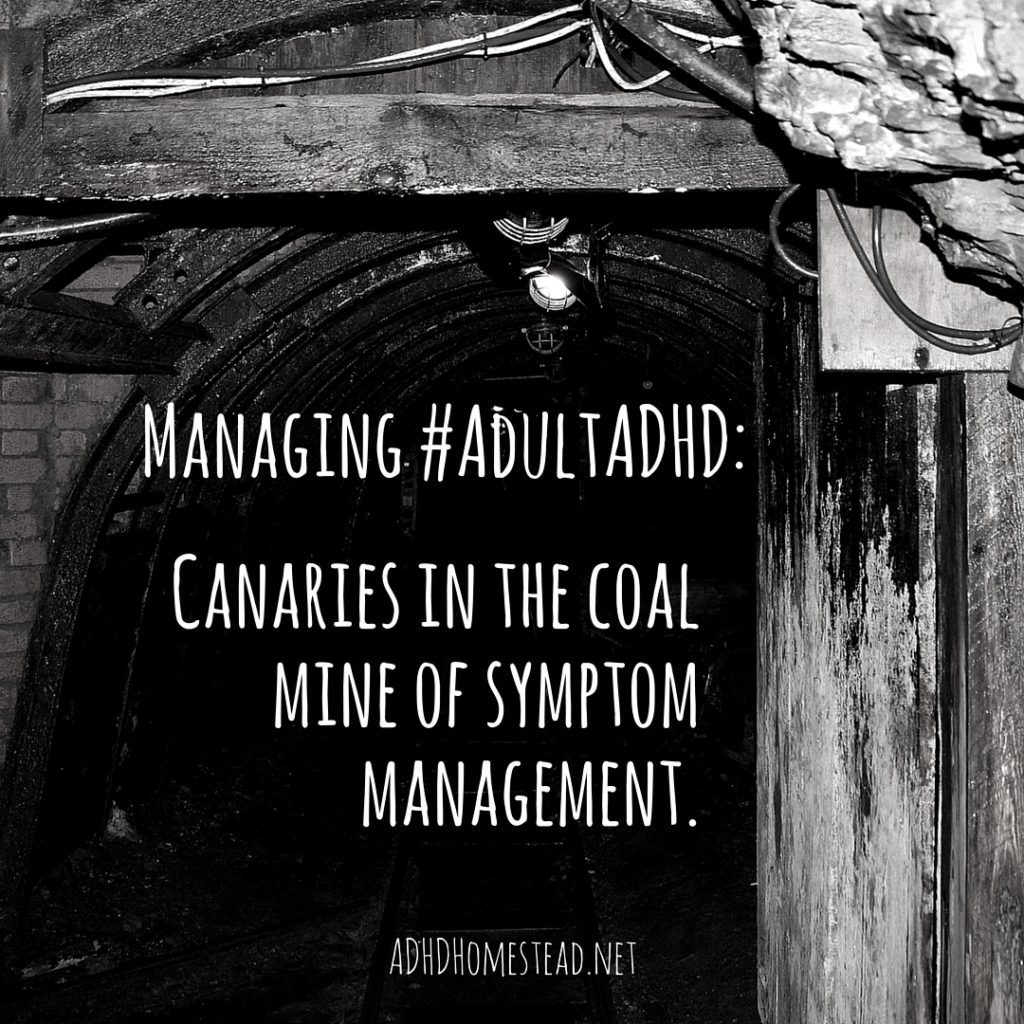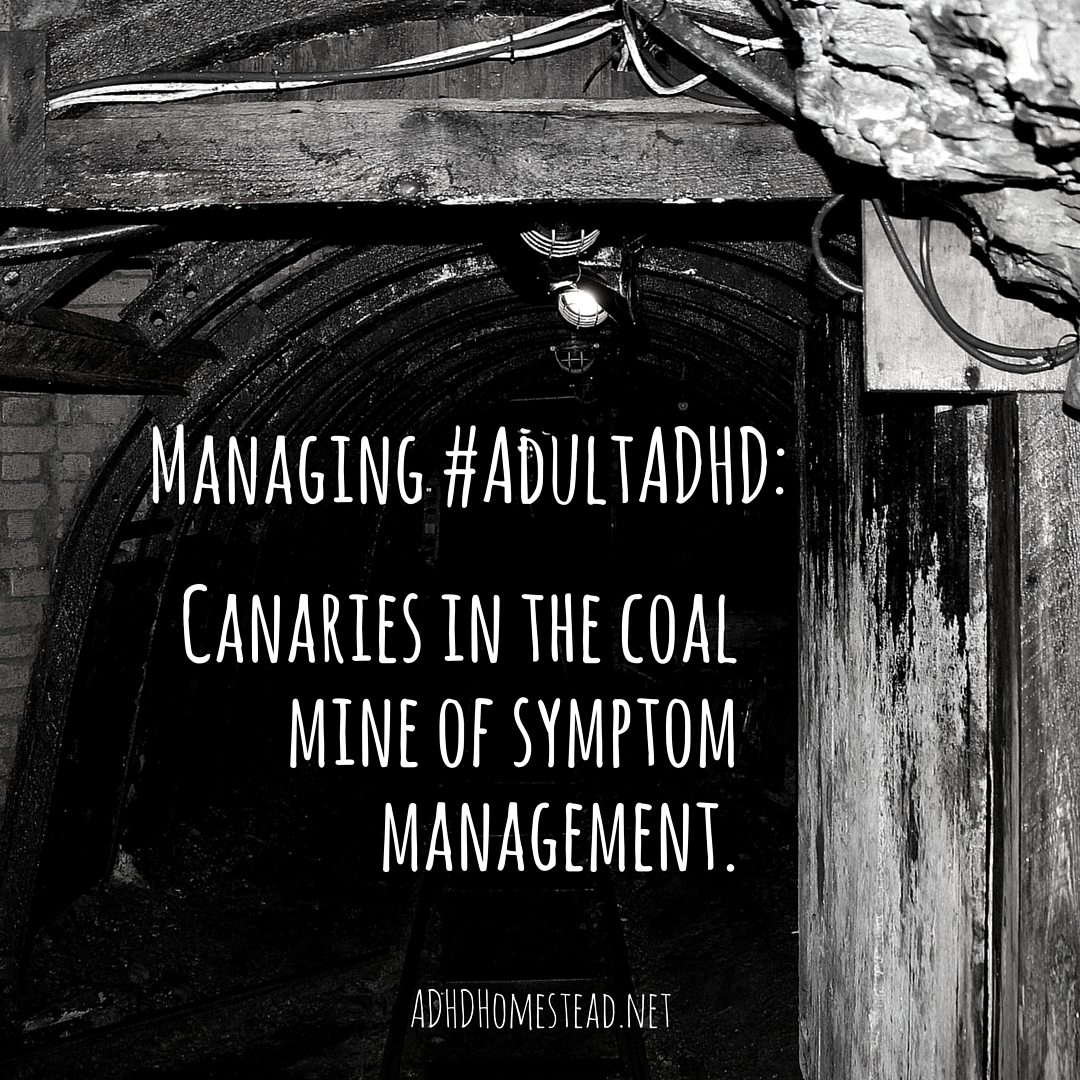Sometimes, I don’t know if I’m managing my ADHD effectively. After all, the right type and dose of stimulant medication should feel pretty unobtrusive. It doesn’t make ADHD’ers feel drugged, hyped up, or otherwise not ourselves. Once the novelty wears off, we don’t sit around and say, “wow, things seem awfully normal around here!”
Those of us with supportive, ADHD-literate spouses can benefit from their outside perspective. Sometimes only they can tell us when our ADHD is out of control.
As medications, hormones, and life have evolved over the years, I’ve also improved my self-observation skills. It’s an advanced-level ability. Pre-diagnosis and treatment, I had zero self-awareness.
Now I’ve identified what I call my canaries in the coal mine: little indicators that reflect the overall success of my ADHD treatment.

Observe with detachment, not judgement.
Objectivity is key to spotting canaries: observing my own behavior with equanimity and pragmatism, and not getting carried away by emotion and judgement. This has required a lot of work. We late-diagnosis ADHD’ers reach adulthood without positive language to describe our struggles. It takes time, effort, and compassion to eliminate negative self-talk and start believing in ourselves. My default reaction to falling off the wagon used to be, “this was inevitable. I can’t sustain anything good. I’ll always fail eventually.”
Now, I try to approach my life like a scientist. I observe, I keep detailed notes (ADHD and motherhood have wrecked my memory), and I try to keep my own biases at bay. When a system begins to break down, that’s a clue. I’m becoming a detective in my own life — a problem-solver, not a basket case.
My canaries: more than a stressful week.
One of my canaries is my weekly review, an every-Monday ritual that keeps me on top of active projects and open loops. I once noticed myself skipping it for weeks in a row. I eventually ended up talking to my doctor about switching medications.
Likewise, when I haven’t even opened my to-do list for over a week, something isn’t right. When I keep looking at my list, but never find anything I feel like I can do, something isn’t right.
While some of life’s details can slide during a high-stress time, others indicate a bigger problem.
Staying organized is possible — if ADHD symptoms are under control.
Staying organized is possible with ADHD — when it’s well-managed. When something slips out of balance, my previously-airtight systems begin to collapse. ADHD makes it hard to notice it happening before it’s too late. I may not feel different right away, or I may wave off red flags with excuses about sleep or a busy week.
The key, for me, has been to disconnect my emotional reaction from the content of my observation. Put-downs and criticism, directed inward or outward, stop problem-solving before it begins. Rather than figuring out how to fix the problem, our brains fixate on the problem itself, and how big and awful it feels.
When a system malfunctions, I ask why, and figure out what adjustments will fix it. Sort of like a car: what’s going to keep it safe, running smoothly, and doing what I need it to do? I once had a car that sputtered out right after starting unless I gave it a very specific amount of gas. Once it settled into a good idle, it was fine. The next owner couldn’t figure this out and thought the car wouldn’t run at all. I probably could’ve gotten several more years out of it.
Now I apply this approach to my entire life. It’s how I knew my medication changed effectiveness after having a child, and I wasn’t just suffering from so-called “mommy brain.”
When I spot one of those canaries, the early warnings that tip me off before my entire life derails, I don’t make excuses. I recognize them as canaries, not black swans. The earlier I recognize a problem, the better my chance of minimizing the damage and getting back on track.
What are your canaries in the coal mine? Have you discovered any early warning signs of poorly-managed ADHD? What do you do when you spot one?
Hey there! Are you enjoying The ADHD Homestead?
Here's the thing: I don't like ads. I don't want to sell your attention to an advertising service run by the world's biggest data mining company. I also value my integrity and my readers' trust above all, which means I accept very few sponsorships/partnerships.
So I'm asking for your support directly. For the cost of one cup of coffee, you can help keep this site unbiased and ad-free.
Below you will find two buttons. The first lets you join our crew of Patreon pals and pledge monthly support for my work. Patrons also have access to my Audioblogs podcast. The second takes you to a simple donation page to pledge one-time or recurring support for The ADHD Homestead, no frills, no strings. Do whichever feels best for you!

